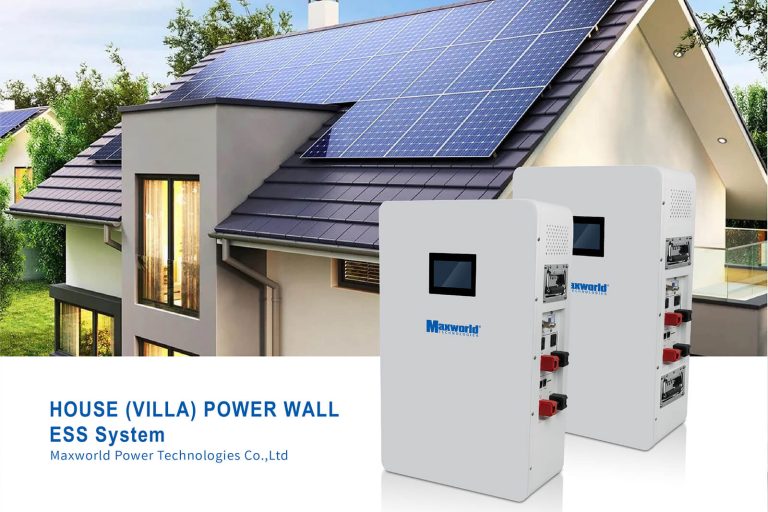In an era where energy efficiency and sustainability are becoming increasingly important, homeowners are seeking ways to reduce their energy bills and minimize their environmental footprint. One of the most effective solutions to meet these goals is through home energy storage systems. These systems, typically powered by lithium-ion (Li-ion) batteries, allow homeowners to store excess energy generated from renewable sources like solar panels, wind turbines, or even from the grid during off-peak hours, to be used when needed most.
In this article, we’ll explore the benefits, considerations, and future potential of lithium-ion batteries in home energy storage systems, and how they are transforming the way homeowners consume and store energy.
Why Choose Lithium-Ion Batteries for Home Energy Storage?
Lithium-ion batteries have become the preferred energy storage solution for homeowners because of their unique advantages over other battery technologies, such as lead-acid or sodium-sulfur batteries. Below, we’ll take a closer look at the main reasons why lithium-ion batteries are increasingly popular for residential energy storage.
- High Energy Density
One of the biggest advantages of lithium-ion batteries is their high energy density. Energy density refers to the amount of energy a battery can store relative to its size and weight. Lithium-ion batteries are much more compact and lighter than traditional lead-acid batteries, making them ideal for residential applications where space is often limited. This means homeowners can install a lithium-ion battery system with a larger capacity in a relatively small footprint.
For example, a typical lithium-ion battery can store up to five times more energy than an equivalent-sized lead-acid battery, allowing for more efficient use of space and offering a higher storage capacity.
- Longer Lifespan
Lithium-ion batteries are known for their longer lifespan compared to traditional energy storage solutions. On average, lithium-ion batteries can last between 10 to 15 years, with some systems able to retain 70% to 80% of their original capacity after 10 years of use. This longevity is due to the chemical stability of lithium-ion cells, which suffer less from degradation over time compared to other types of batteries.
In contrast, lead-acid batteries typically last between 3 to 5 years, with a significant drop in performance after a few years of use. For homeowners, this means that investing in a lithium-ion battery system can be more cost-effective in the long run, as fewer replacements are needed.
- Faster Charging Times
Lithium-ion batteries offer faster charging times than traditional batteries. A fully charged lithium-ion battery can often be replenished in a matter of hours, depending on the size of the system and the energy source. This is particularly important for homeowners relying on renewable energy sources such as solar panels, as they need to store energy during the day for use at night or during periods of low sunlight.
In contrast, other battery technologies like lead-acid batteries can take longer to recharge, which can limit the amount of usable energy stored in a day. A faster recharge cycle allows homeowners to store more energy within a shorter time frame, making the system more efficient overall.
- Better Efficiency
Lithium-ion batteries have a higher round-trip efficiency than many other battery types. Round-trip efficiency refers to the percentage of energy that is usable after charging and discharging a battery. Lithium-ion batteries typically offer round-trip efficiencies of around 90% to 95%, meaning that almost all of the stored energy can be effectively used.
Other types of batteries, such as lead-acid, often have a round-trip efficiency of 70% to 80%, meaning that more energy is lost during the charging and discharging cycles. This makes lithium-ion batteries a more efficient option for home energy storage, ensuring that homeowners get the most value from their stored energy.
- Smaller Form Factor and Aesthetics
In addition to their high energy density, lithium-ion batteries have a more compact and aesthetically pleasing design compared to other storage options. With their sleek, modern look, lithium-ion batteries can be easily integrated into home energy systems, whether they are installed in a garage, basement, or on a wall-mounted bracket inside the home.
Unlike bulky lead-acid batteries that may need to be housed in special enclosures for safety, lithium-ion systems tend to have a more streamlined form that doesn’t require significant modifications to a home’s structure.
- Safety Features
Lithium-ion batteries have a relatively strong safety record when it comes to home energy storage. Advances in battery technology and system design have greatly improved the safety of lithium-ion batteries. Most modern lithium-ion battery systems come equipped with battery management systems (BMS), which monitor the battery’s performance and temperature, ensuring safe operation.
These systems also have built-in protections against overcharging, overheating, and short circuits, further reducing the risk of failure or damage. While any battery technology carries some inherent risks, such as thermal runaway, lithium-ion systems are generally safer when compared to older battery technologies, such as nickel-cadmium or lead-acid.

The Role of Lithium-Ion Batteries in Home Energy Storage Systems
Lithium-ion batteries are most commonly used in conjunction with solar energy systems, where they store the excess energy generated by solar panels during the day for use at night. However, they can also be used in combination with wind turbines, grid power, or as a standalone backup power solution for homes.
- Solar Energy Storage
The combination of solar panels and lithium-ion batteries is an increasingly popular solution for homeowners looking to become more energy-independent. Solar panels generate electricity during the day, but excess energy is often not needed immediately. Instead of sending this energy back to the grid, homeowners can store the excess power in a lithium-ion battery for use at night or during cloudy periods.
This allows homeowners to maximize their self-consumption of solar energy, reducing their reliance on the grid and decreasing their energy bills. Over time, the savings generated from using stored solar energy can help pay off the upfront cost of the battery system, making it a solid investment.
- Grid-Tied Energy Storage
In regions where grid power is unreliable or prone to outages, lithium-ion batteries can serve as a backup power solution for homeowners. In these systems, lithium-ion batteries can store energy during periods of low demand or during off-peak hours when electricity prices are lower. This energy can then be used during peak demand times, when electricity rates are higher, or during power outages, ensuring that essential devices and appliances remain powered.
Additionally, homeowners may be able to sell excess energy stored in their batteries back to the grid during peak periods, benefiting from energy arbitrage and potentially generating income.
- Standalone Backup Power
For homes in remote areas or places with frequent power outages, a lithium-ion battery-based standalone energy storage system can provide reliable backup power when the grid fails. These systems are independent of the utility grid and can power essential appliances, such as lights, refrigerators, and communication devices, for extended periods of time during an outage.
Considerations Before Installing a Lithium-Ion Battery for Home Energy Storage
While lithium-ion batteries offer many advantages, there are a few important factors homeowners should consider before installing them in their homes.
- Initial Cost
The primary consideration for most homeowners is the upfront cost of a lithium-ion battery system. While prices have dropped significantly in recent years, lithium-ion batteries are still more expensive than other types of batteries like lead-acid. The overall system cost will also depend on the size of the system, the battery capacity, and the installation costs. Homeowners should carefully assess their energy needs and calculate the return on investment (ROI) before proceeding with installation.
- Capacity and Sizing
Choosing the right battery capacity for your energy needs is crucial. The size of the lithium-ion battery should be able to store enough energy to meet your home’s consumption during periods of high demand or power outages. Oversizing the system may lead to unnecessary expenses, while undersizing could leave your home without enough backup power.
- Installation and Maintenance
Installation of lithium-ion battery systems generally requires professional help, as it involves electrical connections and safety considerations. Homeowners should hire a qualified technician to install the system according to local regulations and safety standards. Fortunately, lithium-ion batteries require very little maintenance once installed, making them a hassle-free option for long-term energy storage.
Conclusion
Lithium-ion batteries are a leading technology for home energy storage, offering many benefits, including higher energy density, longer lifespan, fast charging times, and greater efficiency. They are particularly ideal for homeowners who want to optimize their energy use, reduce reliance on the grid, or maintain power during outages.
As energy costs rise and the push toward sustainable living intensifies, lithium-ion batteries are becoming an increasingly viable and attractive option for residential energy storage. By understanding the advantages and carefully assessing energy needs, homeowners can make an informed decision to install a lithium-ion battery system that will provide reliable, cost-effective power storage for years to come.

